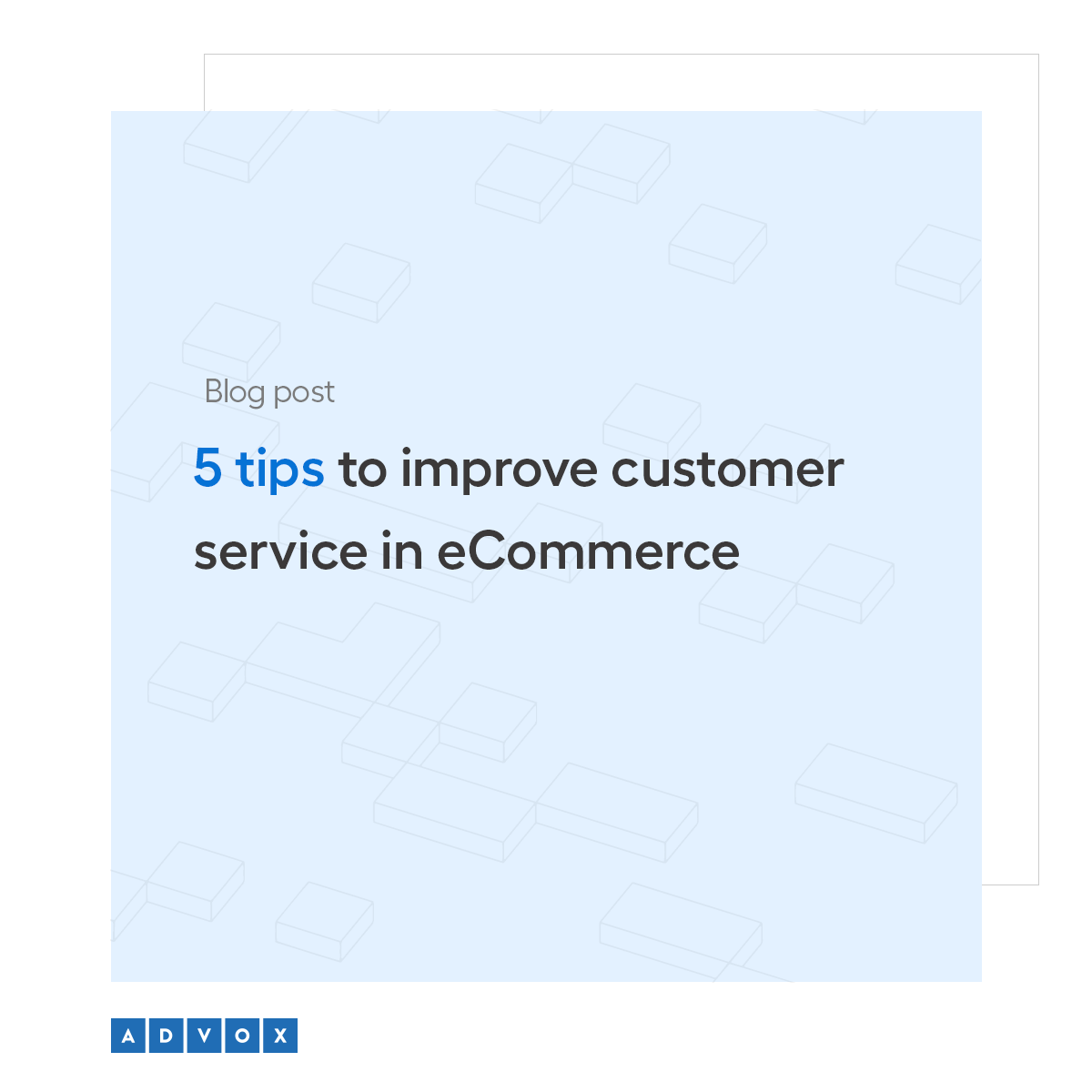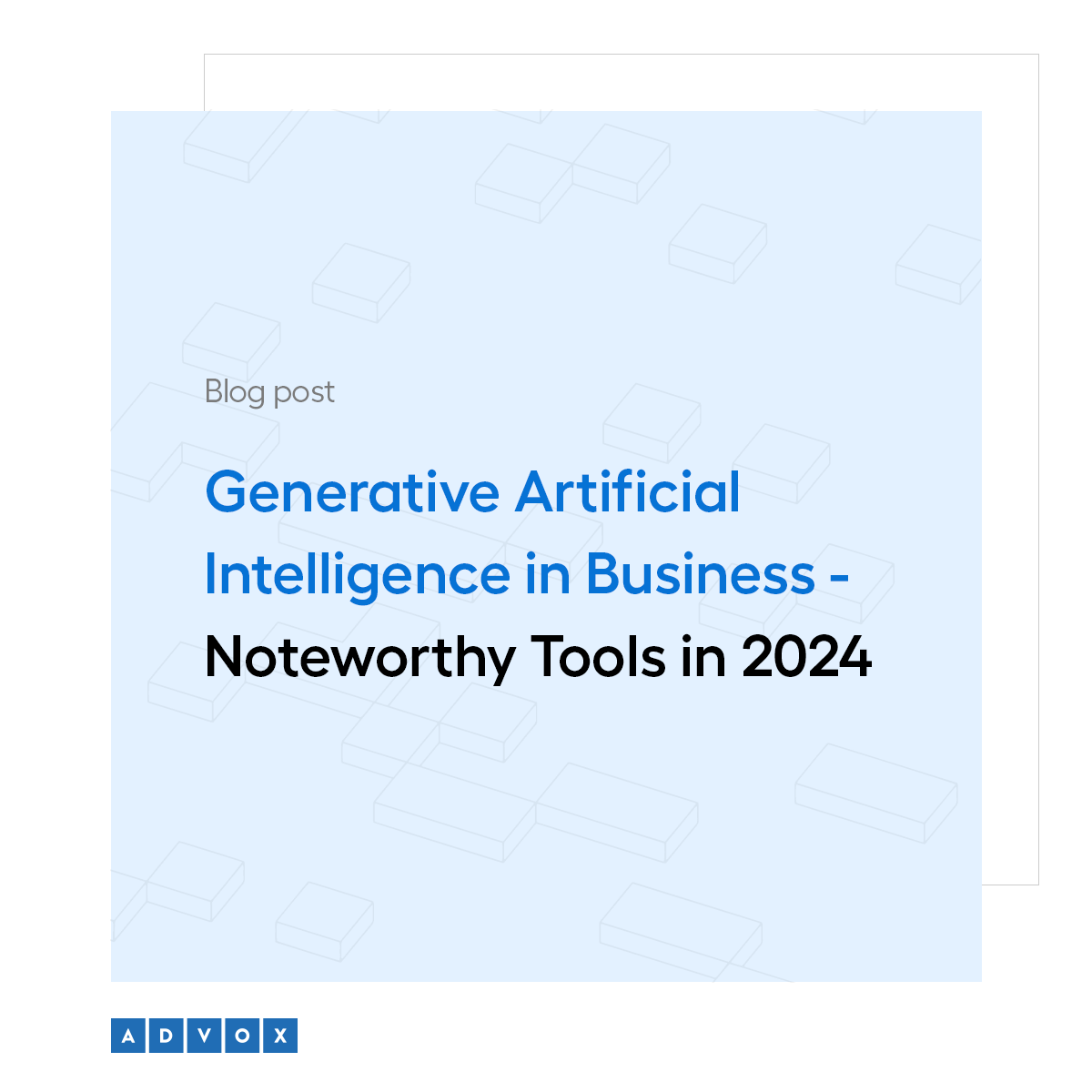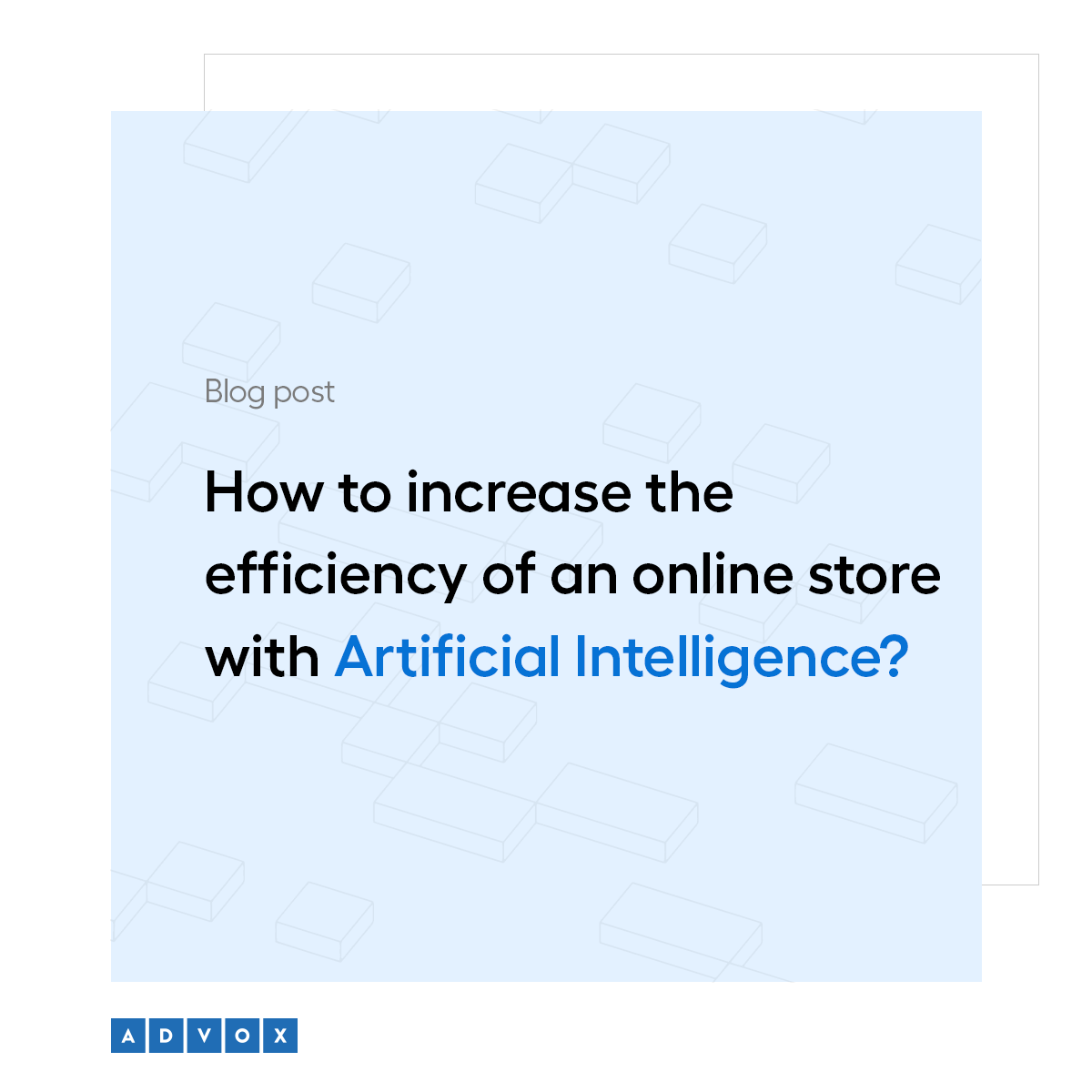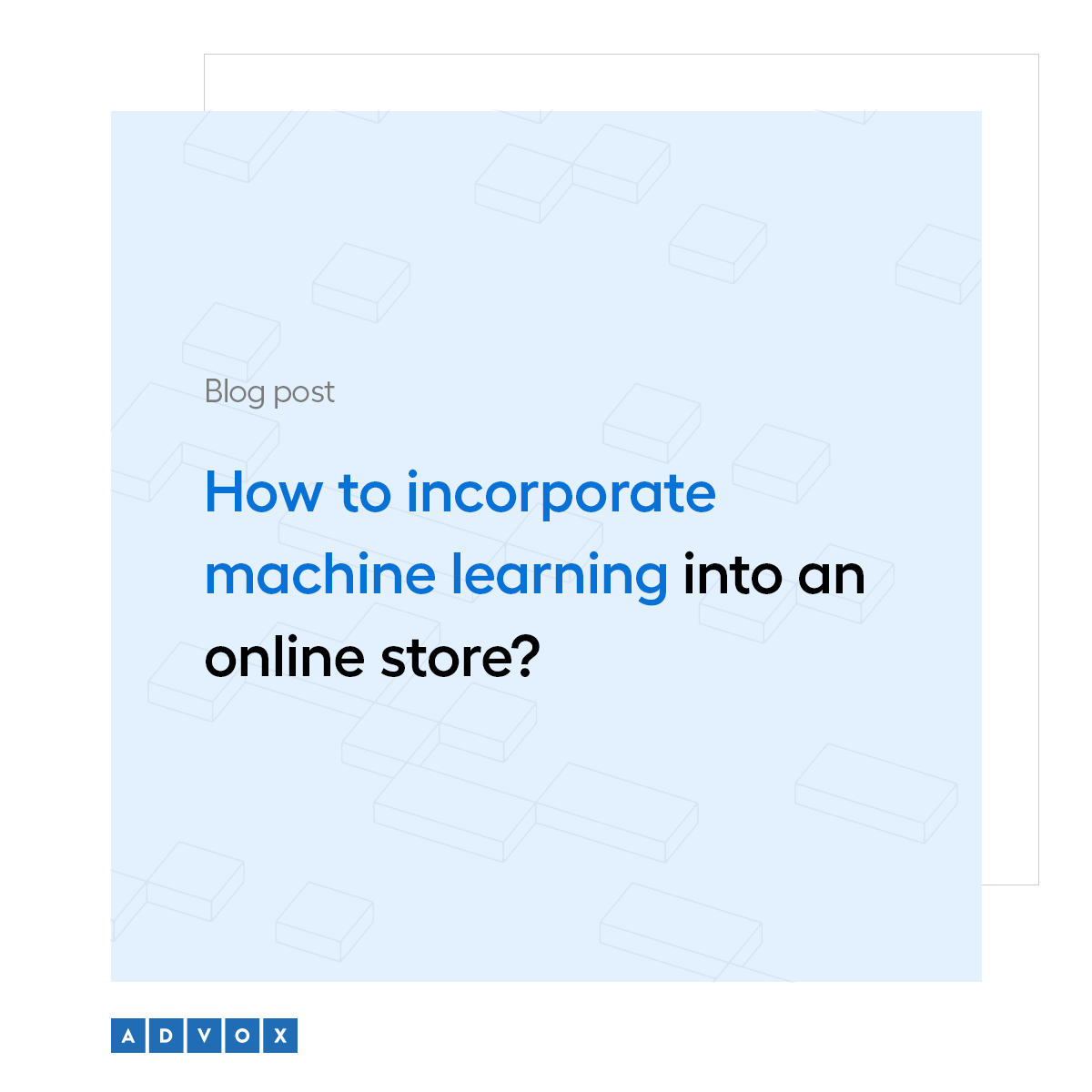Table of contents
- What is artificial intelligence?
- How does artificial intelligence work?
- Why did online stores fall in love with artificial intelligence?
- Where is space for artificial intelligence in an online store?
- Challenges associated with implementing artificial intelligence - what to consider?
- Your e-commerce and artificial intelligence - a perfect match?
- data collection – the system gathers data from various sources, such as internal and external databases. The more data it collects, the better it can "learn" and predict behaviours.
- pattern recognition – during this phase, algorithms analyse the collected data to identify patterns. The learning system identifies recurring patterns of data and adjusts its predictive models accordingly.
- prediction – once the system has learned patterns, it can proceed to predict future events or behaviours based on new data. At this stage, AI can make forecasts, detect anomalies, or make decisions, all depending on specific goals.
- task execution – in the final stage, AI uses the collected data and learned patterns to perform specific tasks or take specific actions. This may include recommending products, classifying messages, or controlling production processes.
- maintaining or gaining a competitive advantage (84%),
- starting a new business or launching operations in a new market (75%),
- reducing operating costs (63%),
- better collaboration with other companies already using AI tools (61%),
- meeting consumer expectations (59%).
- offer personalization – by utilising AI (especially machine learning), it's possible to analyse customers' purchasing behaviours, preferences, and purchase histories to deliver personalised product recommendations.
- automate purchasing processes – artificial intelligence enables the automation of many processes in an online store, saving time and resources. For example, AI can be used for automatic price management, inventory optimization, or order processing.
- enhance platform security – AI can also provide a higher level of security in an online store. Detecting and preventing fraud, protecting customers' personal data, and monitoring IT infrastructure security are just some of the functions that artificial intelligence offers in this area.
- create unique shopping experiences – innovative solutions, such as virtual fitting rooms, metaverse (shopping in virtual stores), 3D product visualisations, and virtual assistants revolutionise the online shopping experience. Thanks to them, customers can interactively experience products, leading to increased purchase confidence, greater engagement, and consequently, improved conversions.
- Which areas of your e-store require the most improvement?
- What are your business goals for implementing AI (e.g., increase sales, improve customer service, optimise logistics processes)?
- What are the expected costs of implementing and maintaining AI in your online store?
- Do you have the proper human resources to implement AI tools, or will you need an outside team to do so?
- What return on investment do you anticipate?
We use the help of artificial intelligence (AI) on a daily basis - for example - reaching for a smartphone to search for information about an item of interest via an image or selecting a TV series based on recommendations personalised for us. AI, at a pace faster than ever (and often almost imperceptibly), not only transforms our routine but also changes the face of business. This evolution is particularly visible in industries such as eCommerce. According to research by PwC, 54% of surveyed companies had decided to use artificial intelligence by November 2023. This means that AI has ceased to be a technology that can be treated merely as "nice to have" in the hierarchy of functionalities on a sales platform and has become an important element of the strategy for many e-businesses. Find out why it's worth investing in AI for your e-store!
What is artificial intelligence?
It is difficult to clearly define what artificial intelligence is. AI is a rapidly developing and complex field. For this reason, it is useful to look at the term "artificial intelligence" as an umbrella that gathers a wide range of approaches and technologies.
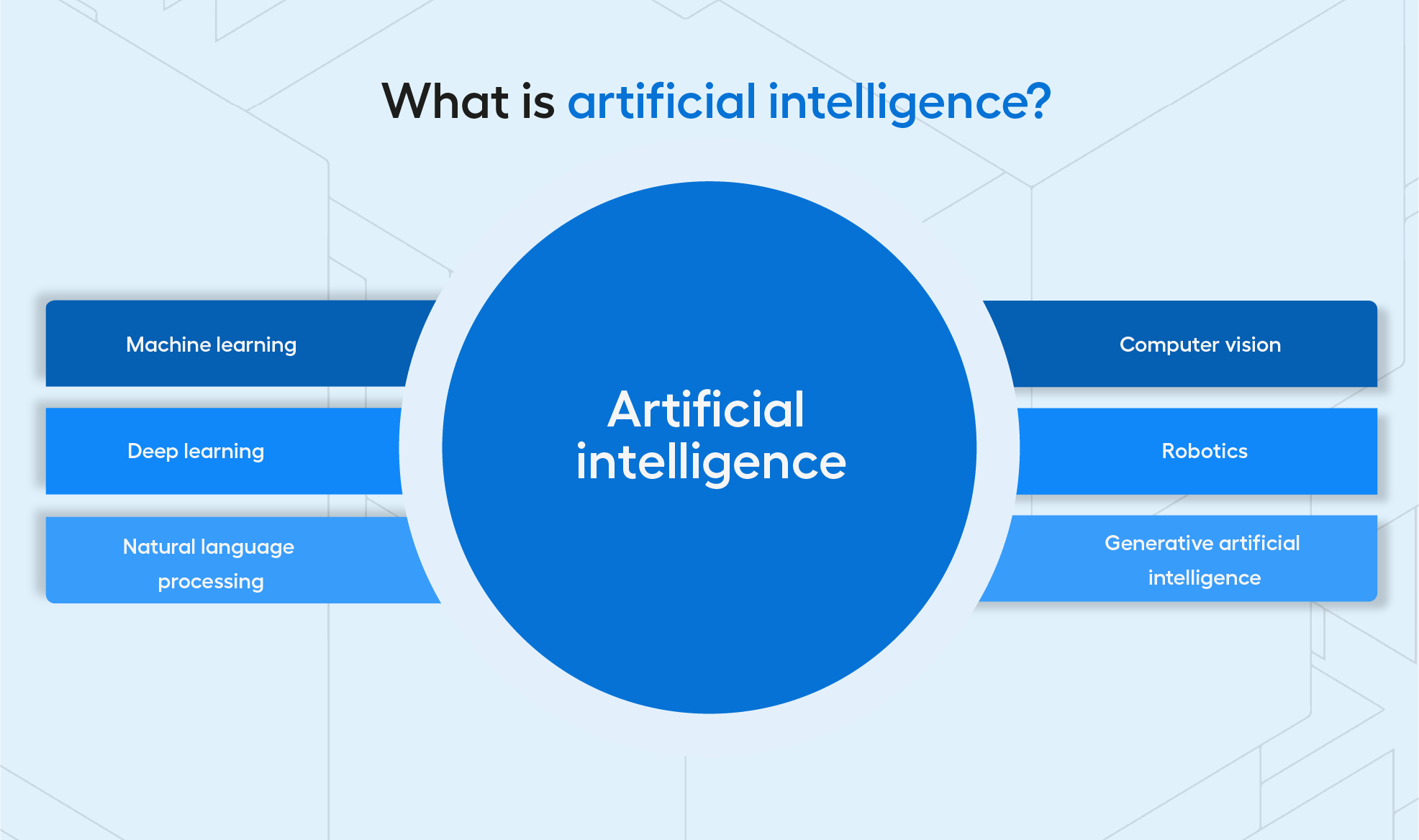
Artificial intelligence is a concept that includes a wide variety of methods and techniques, such as machine learning, natural language processing, data analysis, generative artificial intelligence, deep learning, robotics and many others. With such diversity, AI systems can be used to solve a wide range of problems and challenges - from simple routine tasks to more complex scientific and business problems.
How does artificial intelligence work?
Does AI still sound like an enigmatic concept? To understand the general principle of how AI works, it's helpful to use a simplified schema of its operation. The basis for most systems are algorithms, sets of rules and instructions. Based on these algorithms, AI can analyze provided data appropriately. This entire process can be divided into 4 basic stages:
This simplified model of AI operation can help understand the general concept and possibilities of this technology. However, reality may prove to be much more complex, and individual processes more advanced.
Why did online stores fall in love with artificial intelligence?
Amazon, Ikea, Zalando – these are examples of the largest sales platforms that successfully utilise artificial intelligence in their strategies. However, not only industry leaders decide to use this type of technology. The availability of AI-based tools is constantly growing, and the dynamic development of this field makes them increasingly accessible to a wide range of entrepreneurs. Both the price and the ease of implementing ready-made solutions are becoming more affordable.
According to a study by business2community.com, organisations most often decide to implement AI solutions due to:
Although the above reasons are diverse, they perfectly indicate the wide range of benefits that AI can bring to business. Artificial intelligence improves both internal eCommerce areas (e.g., through the automation of routine tasks) and creates a friendly and intuitive space for customers. Thanks to AI, online stores can better understand their customers' behaviours, respond more quickly to market changes, and provide personalised and satisfying shopping experiences.
Where is space for artificial intelligence in an online store?
Artificial intelligence can be successfully applied in every area of eCommerce. Starting from personalising offers in an e-store and recommending products, through automating purchasing processes, to customer service and inventory management. Currently, there are increasingly more tools available on the market (both paid and with free versions) that you can successfully use to:
These are just examples of using AI in everyday eCommerce operations. However, if you want to delve into the subject and discover the full potential of this technology, more information awaits you in our free eBook. You will find not only descriptions of specific tools but also tips on how to best utilise them in your e-store.
Challenges associated with implementing artificial intelligence - what to consider?
The decision to implement artificial intelligence into an online store requires careful consideration. You must take into account many issues: your budget, project implementation time, and the way you will execute it. It's worth establishing priorities right from the start. To do this, ask yourself a series of questions:
Understanding the answers to these questions can help you determine whether your online store is ready for AI or if it's too challenging at the moment. In most cases, implementing minor improvements (e.g., investing in a licence for AI tool for customer data analysis) at the outset should not require excessive effort and can significantly improve the operation of your store and open up opportunities for larger changes.
Your e-commerce and artificial intelligence - a perfect match?
Artificial intelligence not only facilitates operational processes but also changes the strategy and approach to online sales. With AI tools, companies can better analyse data, forecast market trends, personalise offers for customers, and even more efficiently optimise their actions. As a result, artificial intelligence has become an integral part of today's business, and the lack of its utilisation can pose a serious obstacle to competitiveness in the market.
Do you already have AI solutions in your e-store, or are you still considering their implementation? In any case, it's worthwhile to delve into our eBook, which will provide you with additional inspiration and valuable tips (you can never have too much information when it comes to understanding artificial intelligence).
